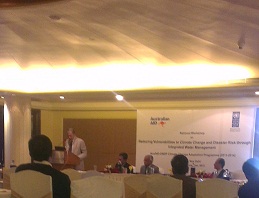Food and Nutrition
Drink safe water and eat good food to prevent creaky bones and achy joints
Posted on 18 May, 2013 01:55 PMFluorosis is a bone disease that is caused by a high consumption of fluoride. Most think that it is a direct result of drinking water with high fluoride content alone but it isn’t so. Nutrition plays an important role in the onset of this disease.

How have India's flagship development programmes fared ? - Budget briefs on the TSC, JNNURM and MGNREGS by the Accountability Initiative
Posted on 12 Mar, 2013 11:40 AMGovernment of India’s development programmes are aimed to bring in much required inclusive development and pave a way towards an equitable and socially just society. With this motive the Centre had introduced several programmes in social sectors and allocated a fixed amount for achieving the set goals.
An analysis on the performance of the programmes shows how far the targets have been achieved, the shortcomings and the steps that are to be taken to strengthen the programmes.

Need for an ecologically sound agricultural system - A video interview with Ardhendu S Chatterjee
Posted on 07 Mar, 2013 05:22 PMIndian agriculture has changed. From earlier a lifestyle to now livelihood, our farming has journeyed through revolutions. Food production increased but so did the problems of depleting soil fertility and rising debt. The green is fading and an evolution is now sought.
The state of environmental migration in 2011
Posted on 07 Mar, 2013 05:15 PMEnvironmental degradation & climate change have induced human mobility by creating environmental migrants.
Some strategies for managing groundwater by Aditi Mukherji, IWMI
Posted on 22 Feb, 2013 09:53 AMGroundwater is essential for India's agricutural economy. However, there is a large variation in the groundwater resources of each region. Some regions are already over-exploited, while others can still tolerate more withdrawal. In her blog 'Waterscapes', Aditi Mukherji discusses the need for regional strategies to manage groundwater economy.
Wastewater irrigation in Hubli–Dharwad, Karnataka, enables farmers to diversify their cropping practices - A paper in the Environment and Urbanisation Journal
Posted on 26 Jan, 2013 06:47 PMThis paper 'Wastewater irrigation in Hubli–Dharwad, India: I
Moving from paddy and sugarcane to less water-intensive crops such as oilseeds, pulses and millets can help resolve the Cauvery water dispute
Posted on 14 Jan, 2013 12:10 AMWhat happens when two or more states are dependent on same water resource for agricultural purposes ? Do the states compete for the resource or are their needs sufficiently different from each other? What are the consequences of the competition for this precious resource?
This article sheds light on the dispute between Karnataka and Tamil Nadu, for sharing Cauvery river water. The ongoing tussle between the two states has seen a lot of unrest amongst farmers in form of dharnas, protests, rail roko and non-cooperation by citizens, and disagreement with the agreements made by their respective governments and unending negotiations by governments involved, to come to a mutually agreeable decision.
Punjab chief minister objects to draft national water policy - Roundup of the week's news (December 31 – January 6, 2013)
Posted on 08 Jan, 2013 08:03 AMObjection raised to National water Policy
Centre adopts National Water Policy 2012 - Roundup of the week's news (December 24 – 30, 2012)
Posted on 31 Dec, 2012 07:33 AMCentre adopts National Water Policy, 2012




